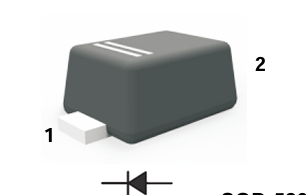Date:2025-06-03 Categories:Product knowledge Hits:369 From:Guangdong Youfeng Microelectronics Co., Ltd
In high-speed switching applications, such as pulse generators or clock circuits, the reverse recovery time of the diode is critical. A longer trr can cause signal distortion and timing errors. When selecting a diode for high-speed use, refer to the datasheet for the trr parameter and ensure it is compatible with the circuit's operating frequency. Additionally, pay attention to the diode's capacitance (parasitic capacitance), as excessive capacitance can also affect high-speed switching performance.Switching diodes
In Clamping and Voltage Limiting Circuits
Switching diodes are commonly used in clamping circuits to set the minimum or maximum voltage of a signal. For instance, a diode can be connected between a signal line and a reference voltage (like ground or a supply voltage) to clamp the signal's negative or positive peaks. When designing such circuits, calculate the current through the diode during clamping to ensure it does not exceed the diode's maximum forward current rating. Also, consider the diode's forward voltage drop to accurately achieve the desired clamping voltage.
Key Considerations During Use Switching diodes
Selection Criteria
Reverse Breakdown Voltage (VR): Choose a diode with a VR at least 1.5 to 2 times the maximum reverse voltage expected in the circuit to provide a safety margin.
Maximum Forward Current (IF): Ensure the diode's IF rating is higher than the maximum current it will carry in the forward direction to prevent overheating and damage.
Reverse Recovery Time (trr): For high-speed switching applications, select a diode with the shortest trr suitable for the circuit's requirements. In lower-speed circuits, a slightly longer trr may be acceptable.
Package and Size: Consider the diode's package type (such as SOD-323, DO-35) based on the circuit board space and mounting requirements. Some packages offer better thermal performance for higher current applications.

Previous: Classification, Structure, and Principle of MOSFET
Next: Circuit Design Tips